Adil Najam
This post continues our series on the events of 1971. The previous three parts of the series can be read here, here, here and here.
It has always surprised me that in all our discussions of the traumas of 1971 the name of Gen. Agha Muhammad Yahya Khan much less frequently than it perhaps should given his role. He presided over the beginnings of a military campaign against what were (then) his own people, what escalated into a full-fledged civil war, eventually an international war, and finally the breakup of the country.
Indeed the complexities were great, there were many other individuals involved, and the roots of all that happened went much further and deeper than just the events of 1971. Yet, Gen. Yahya Khan was in command – of military as well as civilian operations – in those moments of ignominy. But still, for some reason his mentions tend to be fleeting. Although never flattering, there is a sense that we want to move away from the topic of Gen. Yahya Khan as soon as we can; possibly to get to that perennial favorite topic: Zulfiqar Ali Bhutto.
In watching this video (from July 31, 1971) this thought struck me again. I realized that at least I had never before seen a recording of him speaking at length. This particularly interview was particularly disturbing also for its content. The arrogance that he was known for and the sense that he as indeed out of touch with what was happening in the country are all too evidently on display:
“If a Head of State is out of touch with any part of his country, I don’t think he has any damn right to remain Head of the State… the moment I find I am out of touch – out of touch with my people – I shall quit… I know East Pakistan more than East Pakistanis know themselves… I am not out of touch. I know exactly hat is happening.”
Equally disturbing is the bit where towards the end he rants about Ireland. This is more disturbing because this is a commentary not only on 1971 but on today. It is all too often that when confronted with evidence of problems within our own polity and society our gut instinct is to (a) highlight how “we are not alone in doing whatever is being condemned” and (b) to argue that since others do it too, therefore it must not really be that bad!
Such discourse has always disturbed me because on the one hand it holds ourselves to the lowest possible standards and on the other hand it it comes across as a sign of being in denial. I hope readers will hear this part of the video (at the end) with care and think hard about how we ourselves sound exactly the same when we make similar arguments about denial!
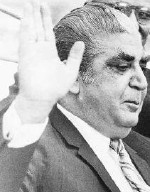
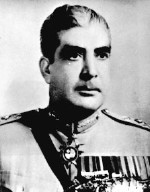
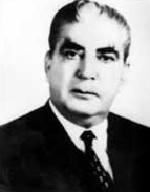
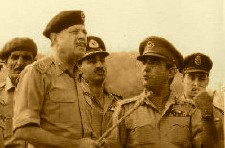
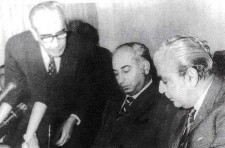



















































scary to see a moron like him rising to the top.
Yahia Khan is portrayed as a monster in BD, there is a famous poster where this General has been portrayed as a monster with blood in its face. Bengalis also have a song dedicated to this General, the song goes like this..
“Hey Yahia, who has turned our golden bengal into a graveyard? You have to answer this.”
Thank you for highlighting this…. We have never really looked at Yahya’s role properly because people have been so focused on Bhutto.
Truths have to be reconciled with at any cost. We can not continue to live in a state of denial for ever. We won’t be able to. These are some truths:
1. To say that in 1971, we lost half the country is incorrect. There were more Pakistanis in East Pakistan than there were in the Western wing. The truth is that the majority was lost. The greater part of the nation of Pakistan simply chose to reidentify themselves. Why? What were they convinced they would not get – and ironically from the minority? It was “equality”.
2. Nations can not and do not survive without equality existing at every single plane.
3. There has to be perfect equality, of all kinds, at all levels, among all federating units.
4. There has to be perfect equality, of all kinds, at all levels, among all ethnic denominations.
5. There has to be perfect equality, of all kinds, at all levels, among all religious denominations.
6. There has to be perfect equality, of all kinds, at all levels, between urban and rural.
7. A common religion evidently could not prevent the nation of Pakistan from breaking up. This proves that it takes a lot more than a common creed to bind a nation together. In fact sometimes a State Religion serves the purpose of a perfect distraction. Elusive dividing forces act while the nation slumbers in the illusion of a common religion.
Equality and absolute equality on all these planes will have to be established. 1971 to 2010 makes 39 years of denial. The lesson to be learned is that there are no shortcuts to survival, and there are no concessions for those who deem themselves “more equal”.
Great post
I think the history of 1971 is never complete until we get information on what Sheikh Mujib, he is one of the least covered political personality. I think our media even today is biased on not showing his speeches since we still have the 1971 mindset of calling everyone a Traitor
Indira Gandhi on 1971
http://www.youtube.com/watch?v=fKiQboyDMUo
Sheikh Mujib with David Frost just after the independence of Bangladesh
http://www.youtube.com/watch?v=hXZahA8D7JE